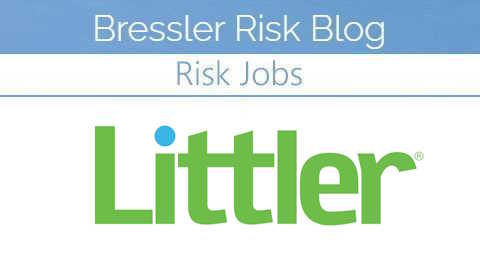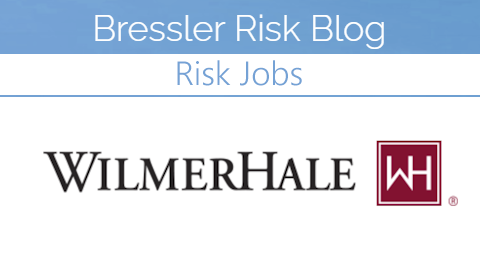BRB Risk Jobs Board — Conflicts Analyst (Littler)
Posted on
In this BRB jobs update, I’m pleased to highlight an open role at Littler: “Conflicts Analyst” —
- The Conflicts Analyst is accountable for accurate conflicts analyses, completed in a timely fashion with sufficient care to detail and thoroughness so as to minimize risk to the Firm.
- This is a remote position. If resident in Kansas City, MO or Atlanta, GA, a hybrid work schedule will be required.
- Pursuant to Colorado, California, Hawaii, Illinois, Maryland, Minnesota, Nevada, Massachusetts, New Jersey, New York and Washington, DC regulation, the salary range for this position is $32.00 – $44.80 per hour and includes eligibility for performance-based bonuses.
- Factors which may affect starting pay within this range may include geography/market, skills, education, experience and other qualifications of the successful candidate. We offer generous compensation and benefits packages. For more information visit: https://www.littler.com/benefits/state-details.
Responsibilities:
- Ensures that parties are entered correctly into the conflicts database, including corporate family trees, for conflicts purposes.
- Ensures that conflicts analyses are communicated accurately and thoroughly to attorneys or management in writing (where appropriate) and orally.
- Accountable for responsiveness, clear communication and excellent service toward internal customers.
- Perform such other/additional duties as may from time to time be assigned.
Qualifications:
- Demonstrated familiarity with Intapp Open, Elite/3E or other conflicts and financial software. Familiarity with Dun & Bradstreet, Orbis, Capital IQ and/or other corporate-family or legal research tools. Demonstrated proficiency with Microsoft Outlook, Word, and Excel.
- Demonstrated ability to:
- Organize and prioritize numerous tasks
- Address tasks in a logical sequence and minimize errors while maintaining quick turnaround times.
- Demonstrated ability to prioritize the work of others and appropriately balance responsiveness with accuracy and thoroughness
- Demonstrated ability to communicate complicated and detailed conflicts analyses to attorneys or management in writing or orally.
- Demonstrated ability to communicate with and effectively follow the direction of a diverse group of attorneys and staff, and to provide good customer service to all levels of an organization.
- Demonstrated familiarity with law firm engagement letters, outside counsel guidelines, conflict waiver agreements, and basic elements of law firm structure and administration.
- Demonstrated ability to run conflicts searches and review conflicts reports for potential conflicts of interest, take steps to resolve potential conflicts, and appropriately escalate issues if needed Demonstrated ability to analyze accurately potential conflicts of interest, including investigating the facts of the situation by asking questions of attorneys and analyzing data housed in firm systems. Awareness of (a) cures for conflicts such as waivers and ethics screens and (b) conflicts that cannot be waived.
Education and Certifications::
- Required: Associate’s degree or relevant education and experience
- Preferred: Bachelor’s or Paralegal certificate.
Experience Required:
- Minimum 2+ years of relevant experience.
- Law Firm experience is preferred.
See the complete job posting for more details on the job and to apply for this position.
About Littler
Littler is the largest global employment and labor law practice in the world exclusively devoted to representing management. With more than 1,800 attorneys in over 100 offices worldwide, Littler serves as the single source solution provider to the global employer community. Consistently recognized in the industry as a leading and innovative law practice, Littler has been litigating, mediating and negotiating some of the most influential employment law cases and labor contracts on record for over 75 years. Littler’s unparalleled commitment to labor and employment law helps clients navigate a complex business world with nuanced legal issues—building better solutions for clients’ toughest challenges. With deep experience and resources that are local, everywhere, Littler is fully focused on its clients. With a diverse team of the brightest minds, Littler fosters a culture that celebrates original thinking. And with powerful proprietary technology, Littler disrupts the status quo—delivering bold, groundbreaking innovation that prepares employers not just for what’s happening today, but for what’s likely to happen tomorrow.
For more information about our firm visit: www.littler.com.
And if you’re interested in seeing your firm’s listings here, please feel free to reach out…



 In this BRB jobs update, I’m pleased to highlight an opening at Shipman & Goodwin: “
In this BRB jobs update, I’m pleased to highlight an opening at Shipman & Goodwin: “




